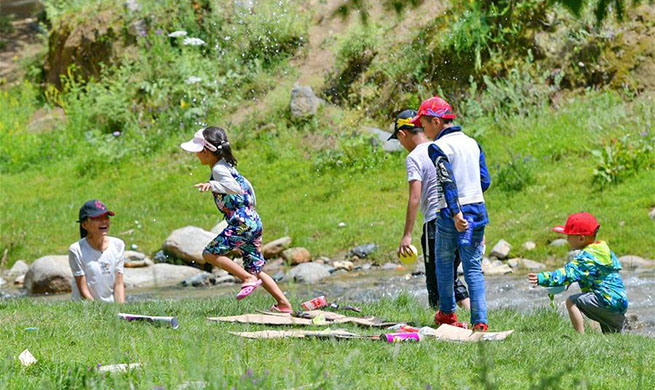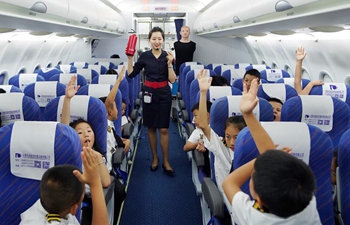by Ndalimpinga Iita
WINDHOEK, July 21 (Xinhua) -- Wanabe Sikwaya from a far-flung village in the north-western part of Namibia had to travel over 70 kilometers to access condoms.
"Condoms are not readily available in our area. No small shop here sold condoms either," said Sikwaya Thursday.
For Sikwaya, this meant that he had not many options for protection, more so, given that he knew little about alternative methods of family planning.
In three years, he has fathered five children by the age 23, of whom one is deceased.
Sikwaya's tale is similar to that of many young villagers in the north-western part of Namibians, who, over the years, struggled to access condoms and are at risk of HIV infection or early age parenthood.
Namibia faces the challenge of teenage pregnancy, which has a direct bearing on the maternal mortality accounting for eight percent of all maternal deaths, according to the Ministry of Health and Social Services.
In any case, as luck would have it for him, this year, the United Nations Population Fund (UNFPA) and Namibia's Ministry of Health and Social Services premiered a condomize campaign in the country's Zambezi region in July.
There, Sikwaya and other young people in the north-western part of Namibia had the chance to participate in the condomize campaign.
The campaign aims to intensify the use of condoms, especially amongst youth, to prevent new HIV infections and teenage pregnancy.
Records show that about 12.6 percent of the adult population in Namibia is living with HIV. By September 2019, 204 00 people are estimated to be living with HIV would be on antiretroviral treatment.
The use of condoms is the variable methods that prevent infections and unwanted pregnancies, said Ivan Simasiku, Chairperson of the Comprehensive Sexuality Education Club.
According to her, despite progress made in reducing HIV infection, teenage pregnancy, and gender-based violence remain some of the factors detrimental to the country's development.
"Rural youth also lack access to information and condoms. The campaign brings the services and material closer to the people," she said.
The campaign has since been instrumental in shifting mind-sets and social conduct of young people.
There, Sikwaya was able to access more information about condom usage.
He is not the only one.
Mukuve Kasu said that the conversations and demonstrative sessions held and is an eye-opener towards a responsible sexual reproductive life.
"I learned new things. So I realized that I could not do things; however, I feel like without bearing in mind the consequences," he said.
Dennia Gayle, UNFPA's Country Representative, said that the campaign is timely, in order to empower the youth to make informed decisions.
"There should be a commitment to accelerate progress in investing in Africa's youth if we are to harness the demographic dividend that comes with the youthful population and the social and economic benefits that comes with that," Gayle said.
Meanwhile, according to Simasiku, there is a need to intensify preventative measures and a comprehensive strategic approach.
"Thus, more young people should take ownership of their social patterns and behavior as future leaders," said Simasiku.
In the interim, back at the local socialization area at the village, Sikwaya is spreading the message of safer sexual practices amongst his peers.
"I also carried some condoms from the excursion. My mission is to encourage peers to alter behavioral patterns and to adhere to safe practices to prevent new HIV infections. The time has come for us as young people to fight for our rights," said Sikwaya.
The condomize campaign was first launched in Namibia's northern Oshana region in August 2018, to advocate HIV prevention, with emphasis on consistent condom use.
To date, the campaign has reached more than 6,000 young people and distributed 58,000 condoms and 9,000 femidoms nationwide.













